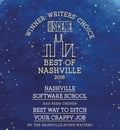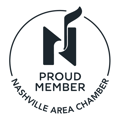Located in the heart of Music City, it’s not surprising that so many musicians and individuals from the music industry come to Nashville Software School (NSS) looking for their next gig. Cohort after cohort, we’ve seen musicians and music industry folk from all different points in their career decide it’s time for a change and seek to learn to code and excel at it in their web development bootcamps and beyond into their new tech careers.
But what is it about musicians that makes them great coders? What draws them to a tech career in the first place? We caught up with some of our alumni who have backgrounds in music and asked how their previous careers relate to their current roles as web developers!
MUSICIANS THINK IN A SYMBOLIC, MATH-BASED, LOGIC-BASED LANGUAGE
In a 2021 article by the Tennessean, NSS Founder and CEO, John Wark, explained the relation between music and programming saying “Music is a symbolic, math-based language. There's lots of logic, lots of pattern recognition, and that's programming."
Alex Curnow of Cohort 39 explains that music and code both stretch one’s brain to be able to mentally hold onto abstractions, and alter those abstractions as you go along. “In music, if you're composing or improvising (especially in a musical language like jazz) you have to deal with changing tonal centers (or "keys"), and understand how they (the keys, chords, and scales) all relate to one another,” he explains. “Your mind might have to keep ‘one foot’ in the original key of the tune while it modulates to other keys, using chords that are outside of (but importantly related to) that original key or set of chords.” Alex says it is that feeling or process that feels very similar to following the data flow through a web application.
PRACTICE, PERSISTENCE, AND PATIENCE
But it isn’t all pattern recognition and logical thinking. Programming also takes practice, persistence, and patience, something that Cohort 30 alumni James Farrell believes musicians and programmers have in common. “Great musicians aren’t born great. They become great because they are excited by challenges, are always learning, and approach mastery as a lifelong journey. I feel tech is the same way,” he says. “You don’t have to be a savant to be successful. You just have to be curious, tenacious, and unafraid to break things.” James spent years in the music industry as a touring musician, writer, producer, and composer and acknowledges that not everyone finds success in the music industry, but those who do understand it’s all about viewing each failure as an opportunity to learn, and continue learning. “In the music industry everybody fails more than they succeed and if you can’t handle it you don’t survive. Those who do survive view each failure as a chance to learn and an exciting new challenge to obsess over. There’s no greater feeling than breezing through a passage of music that once felt impossible to play and I get that same feeling when the code finally runs.”
Esther Sanders of Cohort 42 was a violinist with the Nashville Symphony and also taught for over a decade. She shares that her interest in software development was thanks to the many similarities she found between it and music. “I think music and tech are both fields where we struggle on our own, aka bang our heads against the wall for a good portion of every day,” she laughs. “But [we] also come together to collaborate with others, ask for help, share ideas. Both fields require attention to detail and an ability to zoom out to see how things fit together.”
TECH JOBS ARE STABLE, IN-DEMAND, AND PAY MORE
For some musicians, the decision to transition to tech is driven by their desire for a more stable career. Noah Bartfield decided to seek a new career in tech after a significant shift in his personal life. “As a professional musician, often the hardest part of the work is finding work, and in a tech industry that’s expanding so quickly, it’s nice that there’s never a shortage of jobs or work to be done,” he explains. “After my wife and I found out we were having our second child, I decided it was time to find something new that was interesting and financially sustaining. I had very little understanding of what software development was, so it was very much a leap of faith.”
For James, it was important to continue in a career that challenged him in the way that music always had, but the pay-raise wasn’t bad either. “One of the reasons I loved being a music producer was because you’re constantly learning new tools, technologies, genres, workflows, etc. I just love learning new skills and making something out of nothing,” he says. “To take an application from concept to production is what drew me to tech. That and the job stability and salary… I graduated from NSS on a Friday and doubled my income with my first dev job that Monday. I couldn't believe it.”
CONSIDERING MAKING A CAREER CHANGE?
Noah urges musicians (or really anyone) who might be considering a career in tech to talk to someone with a similar background to yours who attended NSS. “If it sounds even moderately interesting, go for it and trust the process! I often tell people that other than marrying my wife and having children, going to NSS was the best decision of my life,” he says.
“Don’t be deterred by how ‘different’ the two fields seem,” Esther shares. “There are a ton of similarities, and the high stakes of live performances, constant improvement is the perfect training for this field.” She also mentioned a group she’s a part of called Artists Who Code, which is full of people who have made the switch themselves and are now on the other side.
We know there is a lot to consider when you begin thinking about a career change, but here at NSS, we see students from all walks of life and career backgrounds exceed their own expectations. If you’re a musician and are considering a tech career, NSS will be here to help you every step of the way until you get that first job. Learn more about our upcoming programs or even consider taking one of our introductory, 3-week Jumpstart courses.







